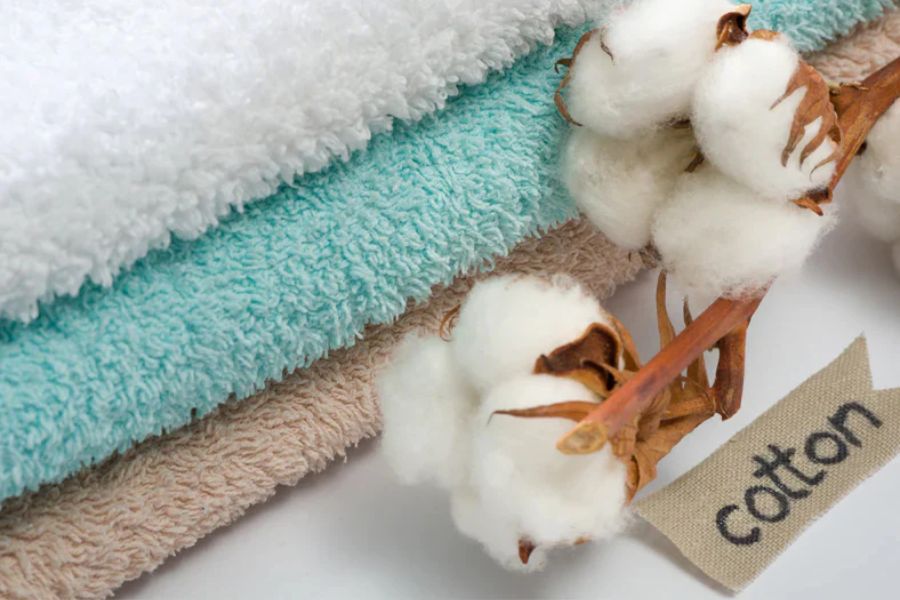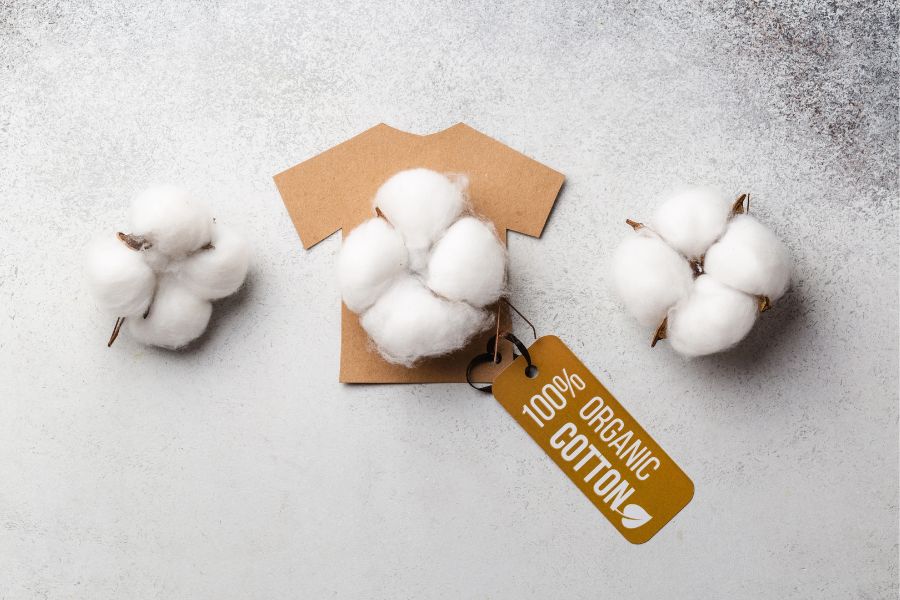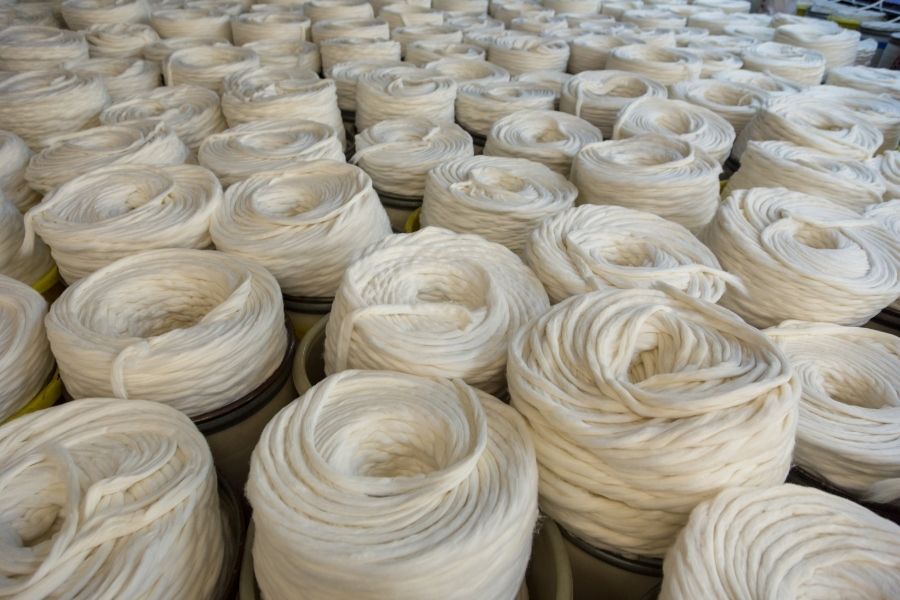
Organic Cotton vs Cotton: A Side-by-Side Comparison
Key Takeaways
- With today's sustainable lifestyle, demand for organic cotton is growing in the textile and fashion industry. It is a type of cotton grown and processed using eco-friendly practices.
- The biggest differences between conventional and organic cotton are how they're planted on the farm and processed in the factory.
- So, which one is better, organic cotton vs cotton? Let's read on and find out!
What Is Organic Cotton?
Organic cotton is a result of cotton plants growing in sustainable ways. In other words, in a more sustainable method. Farmers take care of organic cotton plants with no toxic substances and polluted pesticides. Also, they grow it in healthier soil and fresh rainwater.
The entire farming process of organic cotton needs to follow the Global Organic Textile Standard (GOTS). So, when searching for an organic cotton item, you can check its tag and label. If it has certification from GOTS or OEKO-TEX, then yes, here you are!

Farmers plant organic cotton with sustainable practices.
What Is The Difference Between Cotton And Organic Cotton?
The main difference between cotton and organic cotton is the planting and manufacturing process. Here are some key points:
How It's Grown
First, we'll start with its origin and what creates these materials. While conventional cotton sows are made from GMO seeds, organic cotton originates from non-GMO sources. In other words, the seeds used to plant organic cotton aren't treated with chemicals before planting.
Second, organic vs non-organic cotton is dissimilar in the way farmers crop on the fields:
Fertilizers, Pesticides And Insecticides Methods
To get rid of insect damage and weeds, farmers have to use extensive chemical pesticides for conventional cotton plants. Also, to make it grow faster, farmers often add a massive amount of fertilizers to the soil for prompt nutrition.
In contrast, we can see a more sustainable process on organic cotton fields with natural fertilizers and insecticides. Instead of chemical solids, they manage the crops by manual weeding and tending.

Conventional cotton fields consume more chemicals than organic cotton.
Water Usage
Traditional cotton farming uses freshwater from local communities for irrigation. It both causes water shortages for domestic consumption and harms local ecosystems.
On the other hand, almost all water sources for organic cultivation come from rain and underground. Also, GOTS develops a well-planned water management system and irrigation process for organic farms. That's why organic cotton farms use 91% less water than traditional ones.
Soil Usage
For organic cotton, when the plants start to grow, farmers will rotate the soil for other crops. By doing so, they can retain the water better and preserve the nutrients in the soil.
Meanwhile, conventional cotton is grown continuously with no management. Also, the land may absorb the toxic residue from fertilizers or pesticides. Consequently, it causes soil degradation, and millions of underground animals lose their dream homes.

Organic cotton promotes soil quality, while conventional cotton degrades it.
How It's Harvested
With traditional crops, farmers need help from machines. It helps them harvest large amounts of cotton in a shorter time. However, it may affect the quality of cotton as it is vulnerable if not handled carefully. Meanwhile, farmers handpick organic cotton to achieve a higher standard.
What's more? Some synthetic chemicals can be used in the harvesting process of conventional cotton. It puts the farmers in an unwanted health risk through exposure to toxic substances. As recorded by The Guardian in 2014, over 270,000 Indian farmers have committed suicide on cotton farms since 1995.

Organic cotton differs from conventional cotton in harvesting.
How It's Processed
Before cutting, conventional cotton first goes through various chemical treatments and baths. There, factory workers dye cotton with heavy metals to get the desirable color. Then, again, traditional processing may damage laborers' health as they must work under toxic conditions.
In contrast, as strictly regulated by GOTS, producers can't use chemicals to process organic cotton to prevent serious effects on workers and consumers. Instead, workers treat it with natural dye methods and colorants. In some regions, people extract color from natural plants for dying, e.g., Turmeric, indigo, and henna.
Additionally, in later stages, like spinning, people use traditional approaches like potato or wheat-based recipes to strengthen the yarns. By doing so, they can maintain the integrity of every organic cotton fiber.

Organic vs non-organic cotton is dissimilar in production techniques.
Is Organic Cotton Better for the Environment?
Organic cotton vs regular cotton: which is better? It's a common question in the fashion industry today.
As for the difference between organic cotton vs cotton we discussed above, organic one is more sustainable and ethical. Here are some reasons why it is better for the environment:
It Is GMO-Free
Today, nearly 80% of conventional cotton is genetically modified. This number is rising to 97% in the US. Those numbers can say many things. A large portion of GMOs can trigger the development of genetically modified weeds, native habitat loss, or a decrease in natural diversity.
In contrast, organic cotton seeds are non-GMO. It can maintain the natural characteristics of cotton, keep the soil fertile, and increase nutrition for local species.
It Uses Less Water
Organic cotton is better than standard cotton because it is less thirsty. Organic crops need only 10% water compared to regular farms. Let's do a simple calculation!
It takes about 2,700 liters of water to produce a conventional cotton T-shirt. With organic ones, now we only need 270 liters. Wow! It's such a huge gap. That's why organic cotton is more friendly to our planet.
It Uses Less Energy
In fact, farmers don't need power and fuel for spraying, tractors, or irrigation systems on organic farms. Therefore, organic cotton is more energy efficient. We only need 62% of the energy of conventional cotton to produce an organic cotton shirt.
Accordingly, organic cotton releases half of CO2 compared to regular cotton. Therefore, it helps protect our environment and promote a more sustainable future.

Organic cotton conserves water resources and reduces energy consumption.
It Uses No Chemical Fertilizers And Pesticides
Another reason to make organic cotton more eco-friendly is because it’s free of artificial chemicals. Meanwhile, conventional cotton crops are very pesticide-intensive. It accounts for 16% of global insecticides and 7% of all herbicides used worldwide in agriculture.
Thank God! These hazardous components don't appear on organic crops. There, farmers use natural fertilizers from livestock and poultry waste, plant residues, agricultural products, and aquaculture production.
It Supports Wildlife
On the organic cotton farms, you can see a diverse and lively natural habitat. So, don't be surprised when you come across a snake or some "weird" insects there. In contrast, with a quick visit to traditional cotton fields, you'll easily get bored with dull scenes.
What makes this difference? By saying "no" to hazardous chemicals, organic cotton plants help protect the living spaces of their neighborhood creatures.

Organic cotton contributes to a balanced ecosystem.
It Promotes Soil Quality
There are fewer toxic chemicals abandoned in the soil of organic farms. Therefore, organic cotton helps improve soil nutrients and prevent soil erosion. A better land can grow healthier plants and, thus, absorb more CO2 from the atmosphere.
On the contrary, regular cotton is called the dirtiest farm in the world. The remaining chemicals used in cotton production will go into the cropland and cause soil degradation.
It Is Biodegradable
It only takes from three to five months for 100% organic cotton products to biodegrade in suitable conditions. This period is much faster than synthetic fabrics like polyester or polycotton. Those artificial materials need hundreds of years to decompose.
As a plant-based fiber that easily breaks, organic cotton helps reduce large amounts of waste and protect the environment. Not only that, its residue can be a healthy nutrition source for other species.

Organic cotton easily decomposes in a short time.
Pros & Cons of Choosing Organic Cotton
Pros Of Organic Cotton
Organic cotton has several benefits, such as:
Environmental Impact
Organic cotton is much more sustainable than traditional cotton. With fewer resources used for planting and a lower carbon footprint, organic cotton is a perfect environment-friendly alternative in the textile industry.
By saying no to chemicals, releasing less carbon emissions, conserving water resources, and promoting soil health, organic cotton farming contributes to creating a greener planet. By choosing organic cotton, we - as a consumer - can join hands to promote a more sustainable environment.
Ethical Practices
The advantages of organic cotton are beyond sustainability in terms of the environment. The whole chain to transform organic cotton from seeds to finished products is considerably moral. It includes good working conditions, fair labor wages, no child labor, and more.
A big difference between organic cotton vs cotton is that organic farming creates a more sustainable work atmosphere for everyone. Farmers and workers there do not expose themselves to toxic substances and suffer long-term health risks.

Organic cotton production has fair labor practices.
Safety For Consumers and Farmers
Organic cotton has a standout advantage as hypoallergenic. This property makes it safe for sensitive skin and consumers suffering from allergies. Because it is free from harmful pesticides and toxic dyes, it doesn't cause skin irritation.
Durability
Organic cotton fabric is more durable than conventional cotton. This is because the regular fibers can be damaged by the chemicals used during planting and processing. Meanwhile, with a greener method, organic cotton fibers link stronger and smoother, creating higher-quality clothes.
Softness
In addition, various customers love organic cotton because of its softness. When wearing a shirt made of organic cotton, you will feel it is really gentle and smooth on your skin. That's why many people love to pay more for a sustainable cotton product.

Organic cotton products are softer than conventional cotton.
Non-shrink fabric
In general, you don't need to worry about your organic cotton clothes shrinking after a few washes. However, both conventional and organic cotton can lose its shape when dried on high heat. So, it's best to use a low-heat dryer setting or let your item dry naturally.
Breathability
Besides durability and softness, organic cotton is also more breathable than other materials. Its natural fibers have better airflow, keeping you cool and comfortable throughout the day.

Breathable organic cotton products will keep your skin happy and healthy.
Cons Of Organic Cotton
Here are some disadvantages of organic cotton:
High Cost
When shopping, we all recognize that products certified with organic cotton have a higher price tag. It is approximately 20-30% more than conventional cotton. In some fashion markets, it is considered as a high-end option.
As for sustainable farming and production methods, organic cotton crops are less productive than traditional fields. It is the key factor driving up the price.
Availability And Accessibility
In some regions, it's challenging to find out and buy an organic cotton product. This scarcity comes from:
- The shortage of non-GMO seeds
- Climate change
- High product costs
- Economic downturn
Despite this, demand for organic cotton is increasing in some markets, such as China, Turkey, India, and Kyrgyzstan. When traveling there, you can easily purchase sustainable cotton products at high-end fashion retailers and online stores.

Organic cotton products are often more expensive and more difficult to find.
FAQs
Is Organic Cotton Softer Than Regular Cotton?
As mentioned above, we can see many differences between organic cotton vs cotton. Compared to conventional cotton, the organic option is not only more sustainable but also softer.
No chemical fertilizers or pesticides are used in the planting and production; workers can produce a longer fiber from organic cotton. With a tighter fiber connection, the textile is really gentle on the skin. Therefore, many people are willing to pay more for an item with "organic cotton" tags.
Does Organic Cotton Feel The Same As Cotton?
When touching organic cotton products, you can feel softer and more comfortable than standard cotton. Also, it's more breathable and lighter than other materials.
You can't find these properties in conventional cotton sheets. A production full of synthetic chemicals makes it easy to fray. So, it’s no surprise if you feel itchy when wearing a poor-quality traditional cotton T-shirt.
What Are The Benefits Of Organic Cotton For Sensitive Skin?
Organic cotton is a safe choice for people with sensitive skin. It is free of harmful chemicals during planting and production, so you don't need to worry about skin irritation.
Plus, using natural dyeing techniques is an ideal choice for people who are prone to allergies to artificial fragrances and industrial dyes. Organic cotton will be a perfect solution for clothes, skin care products, sanitary napkins, and diapers.



